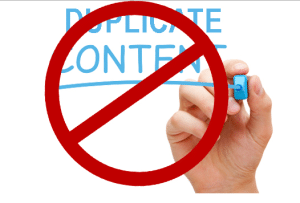So What Exactly Is Duplicate Content?
Duplicate content, from a search engine optimization (SEO) perspective, is any content that appears on more than one web page across the Internet. A single instance of duplicated content can be as small as part of a page, or as large as a majority of the content across an entire domain. Duplicate content is relevant to SEO because search engines may penalize duplicate content in search results, depending on the type of duplicate content and the (assumed) reason for duplication.
Good Duplicate Content?
Duplicate content can be considered either malicious or non-malicious. An example of non-malicious content is duplicate copies of the same page optimized for different browsers, mobile devices, or printer friendliness. These pages would usually be found within a single domain. Republications of the same document on more than one site (with permission) or of slightly different versions of the same document (in cases where copyright is not an issue) would also be considered duplicate content; these might appear on completely unrelated domains. “Malicious content” refers to any content that is duplicated in an effort to manipulate search results.
Are Your Rankings At Risk?
When administrating a website, losing a search rank due to being flagged for duplicate content becomes a concern. However, disclosures from Google and other search engine providers indicate that a site is rarely penalized if it contains duplicate content that appears frequently offsite. Content reposted in a secondary location will rarely affect search priority of the original content; the search engine will rank one of the pages and not the other. Syndication is a tried and tested method of increasing the reach of content and rarely results in a meaningful penalty due to content duplication, particularly because it often refers to the original content.
Search engine penalties for duplicate content do result if duplicated content is determined to be “spammy,” which would generally refer to larger portions of content that is duplicated exactly for no meaningful reason. Keyword stuffing is also usually penalized by search engine algorithms looking for duplicated content. However search engine algorithms are not likely to misclassify meaningfully duplicated content as spam or keyword stuffing, so these types of penalties are rarely a problem for legitimate sites.
Works Cited
“Duplicate Content.” Google Support. Google, n.d. Web. 25 Feb. 2016. <https://support.google.com/webmasters/answer/66359?hl=en>.
“How Does Google Handle Duplicate Content?” YouTube. YouTube, 16 Dec. 2013. Web. 25 Feb. 2016. <https://www.youtube.com/watch?v=mQZY7EmjbMA>.
Author: SEOHoustonPros.com
Published: 05/16/2015


